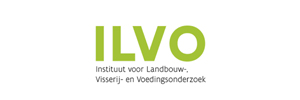Eigen Vermogen van het Instituut voor Landbouw, Visserij en Voedingsonderzoek
EV ILVO is a leading internationally recognised independent research institute with a mission to perform and coordinate policy-supporting scientific research and associated public service in view of sustainable agriculture and fisheries in an economic, ecological and social perspective. EV ILVO builds on the expertise and knowledge of about 600 employees, 40% of which are scientists of various disciplines. EV ILVO conducts research on a regional, national and international level, and is a member of several international project consortia and research bodies. Scientific results of the EV ILVO research are presented in peer reviewed articles, project or annual reports and on international symposia.
The Social Sciences Unit focuses on the general sustainable development of the agricultural industry as well as rural areas, and has expertise in resilience, production and market systems, measurement and coaching for sustainability and profitability, strategic development and policy making, dynamic change processes, participative learning processes, spatial properties and planning, and perception analyses. The unit is currently involved in trans-disciplinary research on learning processes, multi-actor approaches, agent-based modelling and business model development. The Social Sciences Unit will use this experience in the RUSTICA project.
The Plant Sciences unit is experienced with crop husbandry research and sustainable soil management, including the effects of soil tillage, fertilizer type (e.g. compost and biochar), and fertilizer use on yield and soil fertility. ILVO has a BELAC accredited (EN ISO 17025) laboratory for chemical analysis of plant and soil, and also has an integrated Genomics Platform to perform state-of-the-art population genomics research
I am an Environmental Scientist from Spain with a specialization in biodiversity in agricultural landscapes and sustainable agriculture. I studied a Bachelor’s degree in Environmental Sciences and a Master’s degree in Biodiversity and Conservation Biology at Pablo de Olavide University. My broad background in environmental sciences allows me to have a global vision as well as a strong passion for sustainability.
In 2020, I worked with the Strategic Advisory Council for Agriculture and Fisheries on a project to analyze and explore new insights of the agri-environmental measures with a focus on species protection in Flemish agriculture. I organized several workshops with different stakeholders to enrich my project and show the results of my work to determine action lines for the next agri-environmental measures.
Recently, I started working at ILVO as a Ph.D. candidate focusing on projects such as RUSTICA, FOODLEVERS, and SOY2GROW. My involvement in RUSTICA will concern the sustainability in a circular economy for agriculture through a participatory approach using Agent-Based Models. As an environmental scientist, I will focus specifically on the environmental sphere of sustainability for the agricultural sector.
Alba Alonso
Fien Amery (ILVO) is PhD in Bioscience engineering, with expertise in soil chemistry. After a postdoc position at KU Leuven on phosphorus availability in tropical soils, she moved to ILVO in 2012 as a senior researcher. She was involved in several projects on phosphorus in agriculture and environment related to policy. Fien was and is responsible for lab experiments, greenhouse and field trials in various projects. She is involved in topics as phosphorus availability, compost (WP leader of NSR Interreg Soilcom project), N and P recovery for circular agriculture (H2020 Nutriman project) and growing media (Interreg 2Seas Horti-BlueC project). She is deputy responsible of the ILVO lab Plant, Crop and Husbandry and involved in analyses on soil, feedstocks, growing media, compost, water and plants. In Rustica, Fien will be involved in WP7 “Fertiliser blending and validation”. ILVO is task leader for 7.3 regarding laboratory, pot and field validation of product fertilisers that were formulated to match local demands. Fien will coordinate the trials conducted by the several project partners and supervise the field trials with leek and cauliflower to assess the effect of the application of the newly developed fertiliser blends on crop performance and N availability and microbial activity in the soil.
Amery Fien
Hanne Cooreman does research in Educational Theory, Learning Effectiveness and Efficiency, Didactics, Peer Learning and Adult Education at the Research Institute for Agriculture and fisheries (ILVO) in Flanders, Belgium. She obtained a master degree in educational sciences (UGent, 2016) and a teacher degree (2020). In March 2021, she finished her PhD thesis ‘Enhancing peer learning for sustainable agriculture’, related to the Horizon 2020 European project AgriDemo-F2F (2017-2020). Her main ambition is to expand and spread knowledge on enabling educational methods that can bridge and translate knowledge gained through research to be applied in practice. She also wants to draw more attention to the other way around: how can we enable practice stakeholders better to inform the research agenda? Central to these methods are different kinds of (facilitated) dialogue, sharing multiple perspectives and a systemic thinking approach. In line with her interests and together with other partners and EVILVO colleagues involved in WP2, she works on the development and realization of the multi-actor approach in RUSTICA.
Hanne Coreman
I am a post-doctoral researcher at the Social Sciences Unit of the Flanders Research Institute for Agriculture, Fisheries and Food (ILVO), Belgium. The main overarching research question I face is: how can we transform our current socioecological system toward sustainability? In doing so, methodologically, I use Agent-based Modelling (ABM) as one of the computational simulation tools for investigating complex adaptive systems (CACs). Empirically, I apply ABM in contexts containing potential mechanisms of system change such as (re)creation of new (shorter versus longer) food value chains, waste valorisation streams, alternative business models, changes in human behaviour and institutional frameworks in food systems, etc. Moreover, in developing ABM, I take a participatory approach in designing, validating and calibrating the simulation models.
In RUSTICA, my main scientific role is to contribute to Task 3.5. In this task, we develop an ABM based on the collected socioeconomic data aiming to investigate the adoption of new waste valorisation technologies and new value chain creation for the RUSTICA product. Complementing this task, I also contribute to Work-Package 2, where we aim to create a multi-actor knowledge network to ensure a successful collaboration within and between each region by bringing in a wide network of relevant actors.
Siavash Farahbakhsh
Jef Van Meensel obtained a PhD in bioscience engineering at Ghent University in 2011. As a senior researcher at the Social Sciences of EV ILVO, he is responsible for the research cluster “business economics”. He coordinates projects and guides researchers that focus on profitability analysis, the identification of improvement strategies and business models for firms, and the development of decision support tools.
Jef Van Meensel


